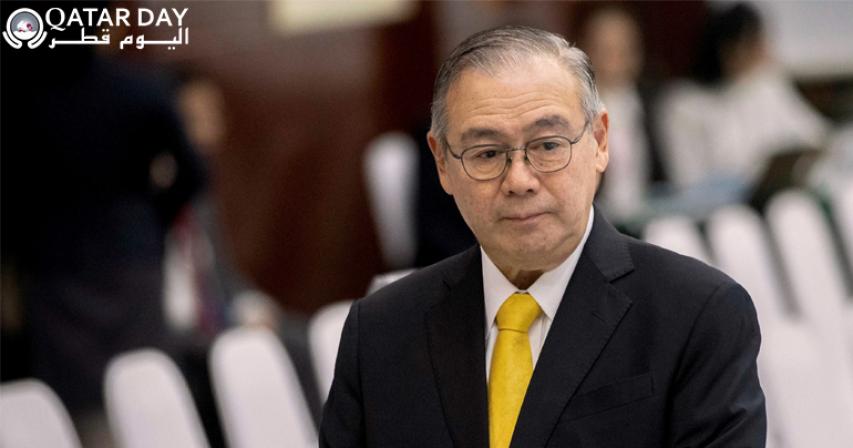Richard Heydarian is an Asia-based academic, columnist and author of "The Rise of Duterte: A Populist Revolt Against Elite Democracy" and the "The Indo-Pacific: Trump, China and the New Struggle for Global Mastery."
Listening to Philippine Foreign Secretary Teodoro Locsin Jr. dial up the rhetoric this week over who owns the Malaysian state of Sabah, you could be forgiven for thinking that Manila is preparing to go to war for the oil-rich territory.
"Sabah is ours!," Locsin thundered before a House of Representatives committee on Tuesday, announcing that he had reactivated Manila's North Borneo Bureau after realizing that the rest of the world had "forgotten our Sabah claim, casually designating it as another country's territory when we have not forgotten it."
The ugly diplomatic showdown has been boiling since July when Locsin fired off a series of provocative tweets over the hot-button issue.
A furious Malaysia responded with a formal statement at the UN reiterating that it "has never recognized the Republic of the Philippines' claim to the Malaysian state of Sabah, formerly known as North Borneo."
Reviving the long-simmering dispute over Sabah could have stark implications. Firstly, it could derail Southeast Asia's united front against Chinese expansionism in the South China Sea. Worse, it could undermine joint efforts to combat terrorism after a spate of unprecedented suicide bombings in the southern Philippines by groups affiliated with Islamic State.
While the Association of Southeast Asian Nations is celebrated as one of the more successful attempts at regional integration in the post-colonial world, what many tend to forget is that ASEAN's founding was partly inspired by a deliberate attempt to de-escalate tensions during the Konfrontasi era when the newly-established Malaysian Federation was at loggerheads not only with neighboring Indonesia but also the Philippines.
The Philippines and Malaysia almost came to blows throughout the 1960s, when special Filipino Muslim commandoes trained to invade Sabah were allegedly halted -- and killed -- by the Marcos regime.
The upshot has been a decades-old religious conflict in the southern island of Mindanao, which some say has been fueled by Malaysia to cynically distract and bog down a belligerent Manila. Over time, the two countries have tried to focus on areas of shared interest, particularly the movement of transnational criminal networks through their porous borders.
Fearing terrorism at home, Malaysia has supported de-radicalization efforts over the last decade and played a pivotal role in facilitating peace negotiations between Manila and the Moro rebels in the southern Philippines. Confronting an expansionist China in the South China Sea, both ASEAN countries increasingly shifted their strategic orientation toward maritime security and cooperation.
Things came to a head in 2013 when a ragtag armed group led by the descendants of the Sultanate of Sulu, who claims ownership of Sabah, launched a unilateral armed attack on the territory, provoking a massive diplomatic crisis between the Philippines and Malaysia.
Eager to preserve constructive relations with Kuala Lumpur, then Philippine President Benigno Aquino called on the Sulu Sultanate to immediately cease its armed activities.
Malaysia responded with a massive ground and naval mobilization, with no less than current foreign minister Hishammuddin Hussein leading that response. Much to the horror of Kuala Lumpur, the episode coincided with growing secessionist sentiments in Sabah, where there is deep resentment over real and perceived neglect by the federal government.
Malaysian Home Minister Hishammuddin Hussein arrives to visit the villagers who defended themselves against a terrorist as a standoff continues between the Malaysian police and an armed group of Filipinos in Kampung Senallang Lama, Sabah in March 2013. © Getty Images
No wonder then that Malaysia was so deeply perturbed by Locsin's bolt-from-the-blue July tweet claiming that "Sabah is not in Malaysia if you want to have anything to do with the Philippines."
Malaysia's Hishammuddin Hussein immediately struck back, accusing his Filipino counterpart of making "an irresponsible statement" affecting bilateral ties. "Sabah is, and will always be, part of Malaysia," he added.
Instead of backing down, Locsin upped the ante, claiming that there "have been repeated attempts to sell that claim [to Malaysia] but no Philippine president has succumbed. You're really stupid [if you think that will happen]."
While many Filipinos have welcomed the reassertion of their country's claim over Sabah, the Philippines' exact motivations are far from certain. For his part, President Rodrigo Duterte has yet to raise the Sabah issue with the Malaysian government despite one visit to Malaysia as president and multiple meetings with its top leaders, including then Prime Minister Mahathir Mohamad who visited Manila last year.
If anything, Duterte's priority seems to be protecting the tens of thousands of Filipino citizens who are illegally residing in Sabah, and who have been vulnerable to abuse and exploitation. Nor is there any indication of a coherent effort by the Philippines to assert its claims through international diplomacy or legal arbitration, never mind military action.
What is crucial to understand is the timing of Locsin's tweets, which have coincided with unusually tough language aimed at China from Filipino top officials over the South China Sea dispute. "We have and continue to assert our rights in the Spratlys [West Philippine Sea]. I am [also] doing that with regard to Sabah," Locsin noted in one tweet.
Notorious for his divisive and often incendiary tweets, it remains unclear whether the Philippine foreign secretary is speaking on behalf of Duterte's administration or is just grandstanding.
Better known as Teddy Boy, the former broadcast journalist firebrand is more likely trying to project a more nationalistic Philippine foreign policy at the same time as the Duterte administration comes under intense criticism at home for its acquiescence toward Beijing. Other Locsin critics think he could be eyeing elected office ahead of the 2022 elections.
But while the Philippines chief diplomat is scoring patriotic points at home, he has recklessly undermined hard-earned and much-needed solidarity and strategic cooperation with Malaysia in the face of ongoing threats from ISIS and China.

Comments